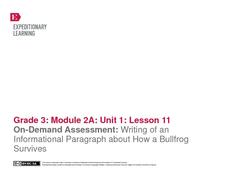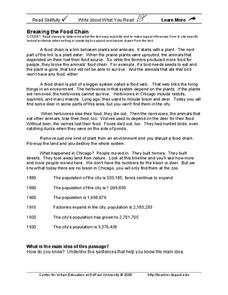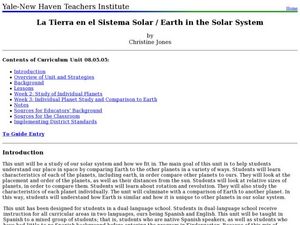K12 Reader
Galileo and His Telescope
Learn about Galileo Galilei's contribution to modern science with a reading passage that focuses on reading comprehension. After kids read several paragraphs about his life, they answer five questions about the information they have just...
PreKinders
Parts of a Tree
Don't bark up the wrong tree with this set of cards! Seven cards present different parts of a tree, including a trunk, branches, and leaves. A great addition to your science or language arts lesson.
Curated OER
A Seashell Lesson: Writing for Detail and the Scientific Process
Practice descriptive language in this lesson, which prompts elementary and middle schoolers to write detailed descriptive sentences describing a seashell. They write a description of a shell, create an illustration, and other students...
NOAA
I Can't Breathe!
The Gulf of Mexico dead zone, an area of low oxygen that kills marine life, costs the United States $82 million every year. Young scientists research anoxic ocean environments then come up with a hypothesis for the cause of the Gulf of...
K12 Reader
Phases of the Moon
Take one giant leap for mankind with a reading passage about the moon. Kids learn about the lunar cycle with context clues and reading comprehension questions, making it a good informational text for your language arts lesson.
K12 Reader
Adapting to Survive
Life science and language arts come together in a passage about animal adaptation. After kids learn about how organisms adapt to conditions in their environments, they complete five reading comprehension questions based on context clues...
K12 Reader
Converting Energy to Motion
Combine science and reading skills with a reading comprehension exercise. Kids read four paragraphs about energy conversion and answer some reading comprehension questions about the information they have read.
K12 Reader
The Scientific Method
Introduce the scientific method with a reading comprehension activity. Have kids read a few paragraphs that describe the process of making a hypothesis, gathering evidence, and taking notes that will support the experiment.
Curated OER
Solar System
Explore the solar system in detail, from it's origins to its components. Visual data gathered by actual space missions has been used to create the images and animations on each page of this stellar electronic book about the solar...
San Francisco Public Utilities Commission
Hetch Hetchy: The Story of San Francisco's Water
How did San Francisco supply enough water for its residents over the last two centuries? Learn about droughts and water conservation in California, as well as specific historical events that led to the water system today. Kids read...
EngageNY
On-Demand Assessment: Writing of an Information Paragraph About How a Bullfrog Survives
Having read and discussed Bullfrog at Magnolia Circle, third graders demonstrate their bullfrog expertise by writing informational paragraphs. Building on the note-taking and paragraph planning from the previous lesson plan,...
San Francisco Public Utilities Commission
Let's Save Water: Water Conservation
Did you know that cutting down your shower by one minute a day can save five gallons of water? Learn about water conservation with a science reading activity. After kids finish reading key terms and water-saving tips in a reading...
NWT Literacy Council
Readers Theatre Scripts
Engage and entertain young learners with this collection of readers theatre activities. With over 25 different scripts, a wide range of topics are covered from simple counting and rhyming exercises to adaptions of popular children's...
DePaul University
The Working Tools of Insects
The animal kingdom is full of interesting organisms that have unique ways of surviving. Children read about different insects that have special tools for building homes and protecting themselves. When finished, learners identify the main...
DePaul University
Breaking the Food Chain
Throughout history, the growth of big cities has resulted in the destruction of ecosystems. In the case of Chicago, IL, a grassland that was once home to bison, deer, wolves, and foxes quickly became a booming city of over three million...
Redefining Progress
Have and Have-Not
Is there a correlation between a country's wealth and the extent of its ecological footprint? What exactly constitutes an ecological footprint, and how does one country stack up against the rest? This is a unique lesson to incorporate...
Curated OER
Earth in the Solar System
A three-week unit designed to be completed in an elementary level, dual-language immersion classroom, this resource includes several lessons intended to introduce young learners to the solar system, the Earth and how the Earth compares...
K12 Reader
Elements & Atoms
Study matter in a new way with a cross-curricular assignment for language arts and math. Learners answer five reading comprehension questions after reading a few paragraphs about the periodic table, properties of elements, and how atoms...
Teach Engineering
You Are There... First Flight
Glide into the study of flight. An engaging lesson has scholars research information on the Wright brothers. They develop props and produce a recreation of the first flight at Kitty Hawk. They then report on the event as if they were...
K12 Reader
Water Carves the Land
What affect do bodies of water have on the world around us? Kids can find out by reading this passage. After reading, they answer five questions related to the text.
K12 Reader
What Glaciers Leave Behind
Glaciers may seem distant and stationary, but they are huge deposits of moving ice that have made changes to the earth's surface. Your pupils can learn about the different types of impressions left by glaciers by reading the short...
Intel
Starquest
Almost every ancient culture observed the stars and saw pictures in the patterns. Studying stars allowed them to guide travelers, determine when to plant crops, when to harvest food, and the stories surrounding the images include some of...
California Academy of Science
Optimal and Sustainable: Renewable Energy Revamp
More than 100 cities around the world have shifted from fossil fuels to renewable energy sources. Scholars investigate a city wanting to make this switch, but needs help determining how to make the shift. Groups consider all options,...
PBS
Stories of Painkiller Addiction: Contemplating Nature vs. Nurture
Does having an addict in your family make it more likely to become one yourself? Explore the genetic risk factors, as well as the prominent environmental influences, for substance addiction in a lesson that encourages awareness and open...























